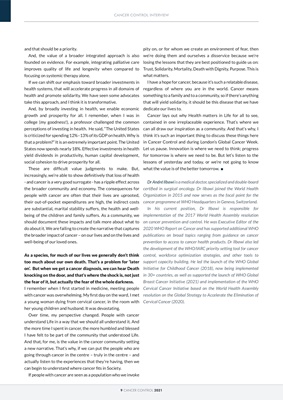
CANCER CONTROL INTERVIEW
9 CANCER CONTROL 2021
pity on, or for whom we create an environment of fear, then
we're doing them and ourselves a disservice because we're
losing the lessons that they are best positioned to guide us on:
Trust, Solidarity, Mortality, Death with Dignity, Purpose. This is
what matters.
I have a hope for cancer, because it's such a relatable disease,
regardless of where you are in the world. Cancer means
something to a family and to a community, so if there's anything
that will yield solidarity, it should be this disease that we have
dedicate our lives to.
Cancer lays out why Health matters in Life for all to see,
contained in one irreplaceable experience. That's where we
can all draw our inspiration as a community. And that's why, I
think it's such an important thing to discuss these things here
in Cancer Control and during London's Global Cancer Week.
Let us pause. Innovation is where we need to think; progress
for tomorrow is where we need to be. But let's listen to the
lessons of yesterday and today, or we're not going to know
what the value is of the better tomorrow. n
Dr André Ilbawi is a medical doctor, specialized and double-board
certified in surgical oncology. Dr Ilbawi joined the World Health
Organization in 2015 and now serves as the focal point for the
cancer programme at WHO Headquarters in Geneva, Switzerland.
In his current position, Dr Ilbawi is responsible for
implementation of the 2017 World Health Assembly resolution
on cancer prevention and control. He was Executive Editor of the
2020 WHO Report on Cancer and has supported additional WHO
publications on broad topics ranging from guidance on cancer
prevention to access to cancer health products. Dr Ilbawi also led
the development of the WHO/IARC priority setting tool for cancer
control, workforce optimization strategies, and other tools to
support capacity building. He led the launch of the WHO Global
Initiative for Childhood Cancer (2018), now being implemented
in 30+ countries, as well as supported the launch of WHO Global
Breast Cancer Initiative (2021) and implementation of the WHO
Cervical Cancer Initiative based on the World Health Assembly
resolution on the Global Strategy to Accelerate the Elimination of
Cervical Cancer (2020).
and that should be a priority.
And, the value of a broader integrated approach is also
founded on evidence. For example, integrating palliative care
improves quality of life and longevity when compared to
focusing on systemic therapy alone.
If we can shift our emphasis toward broader investments in
health systems, that will accelerate progress in all domains of
health and promote solidarity. We have seen some advocates
take this approach, and I think it is transformative.
And, by broadly investing in health, we enable economic
growth and prosperity for all. I remember, when I was in
college (my goodness!), a professor challenged the common
perceptions of investing in health. He said, "The United States
is criticized for spending 12%-13% of its GDP on health. Why is
that a problem?" It is an extremely important point. The United
States now spends nearly 18%. Effective investments in health
yield dividends in productivity, human capital development,
social cohesion to drive prosperity for all.
These are difficult value judgments to make. But,
increasingly, we're able to show definitively that loss of health
- and cancer is a very good surrogate - has a ripple effect across
the broader community and economy. The consequences for
people with cancer are often that their lives are uprooted,
their out-of-pocket expenditures are high, the indirect costs
are substantial, marital stability suffers, the health and wellbeing of
the children and family suffers. As a community, we
should document these impacts and talk more about what to
do about it. We are failing to create the narrative that captures
the broader impact of cancer - on our lives and on the lives and
well-being of our loved ones.
As a species, for much of our lives we generally don't think
too much about our own death. That's a problem for 'later
on'. But when we get a cancer diagnosis, we can hear Death
knocking on the door, and that's where the shock is, not just
the fear of it, but actually the fear of the whole darkness.
I remember when I first started in medicine, meeting people
with cancer was overwhelming. My first day on the ward, I met
a young woman dying from cervical cancer, in the room with
her young children and husband. It was devastating.
Over time, my perspective changed. People with cancer
understand Life in a way that we should all understand it. And
the more time I spent in cancer, the more humbled and blessed
I have felt to be part of the community that understood Life.
And that, for me, is the value in the cancer community setting
a new narrative. That's why, if we can put the people who are
going through cancer in the centre - truly in the centre - and
actually listen to the experiences that they're having, then we
can begin to understand where cancer fits in Society.
If people with cancer are seen as a population who we invoke